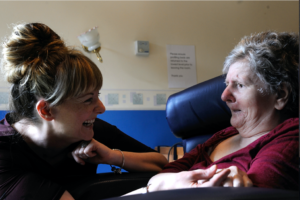Hand in hand: a moment of connection in Public engagement
Dr Maggie Ellis is a Senior Lecturer in Psychology at the University of St Andrews, with a research focus on the psychology of dementia. Through developing the technique of Adaptive Interaction, Maggie and her collaborator Professor Arlene Astell have enabled and cultivated meaningful interactions between individuals living with advanced dementia and their caregivers. This has fundamentally bridged the communication gap apparent as dementia progresses and individuals lose the ability to understand and deliver speech.
With its foundations in simple pre-verbal communication strategies, including to and fro sounds, eye gaze and movement – the very building blocks of communication – Adaptive Interaction reflects each person’s very own unique language. Consequently, individuals have made almost instantaneous eye contact with practitioners, laughed and smiled for the first time in years and reached out to hold their hands. Achieving this one to one connection with a human being living at the advanced stages of dementia is immensely rewarding for Maggie, demonstrating the hugely positive impact of her research in everyday, real life and providing her with a crucial sense of giving something back.
 Public engagement is at the heart everything Maggie does. In her eyes, it is vital for the public to understand what researchers do and why their research is important. Whilst Maggie’s research is understandable, practical and relatable to people who have loved ones living with dementia, other forms of academic research may be harder to convey to a lay audience. However, she believes that that this can be achieved using the right language and means. To nurture an understanding of dementia in the local area, Maggie’s research and Public engagement have gone hand in hand.
Public engagement is at the heart everything Maggie does. In her eyes, it is vital for the public to understand what researchers do and why their research is important. Whilst Maggie’s research is understandable, practical and relatable to people who have loved ones living with dementia, other forms of academic research may be harder to convey to a lay audience. However, she believes that that this can be achieved using the right language and means. To nurture an understanding of dementia in the local area, Maggie’s research and Public engagement have gone hand in hand.
Five years ago, Maggie founded Dementia Friendly St Andrews from which the student-run Dementia Friendly Society was formed at the University. Initially, she trained community groups, businesses and services – around eleven in one year – to learn how they could make their services more ‘dementia friendly’. This involved public speaking and the creation of three-point plans which educated businesses on how to implement changes to more effectively accommodate people with dementia. Nowadays, Maggie continues to work behind the scenes helping to recruit businesses to be trained for Dementia Friendly Fife and coordinates how projects are run within Dementia Friendly St Andrews, including the vintage fashion shows.
Over the summer, Maggie enlisted four students to evaluate the impact of Dementia Friendly Fife on individual businesses, services and individuals in Fife and how the initiative may have been impacted by their involvement. She looks forward to things returning to normal and conducting a research project which will investigate the impact of Adaptive Interaction in four care homes across Scotland. The research project will also have a substantial Public engagement aspect. A conference will present findings documenting how the technique has changed care home practice and will involve care home staff, family members and researchers talking to the general public.
The most important form of Public engagement to Maggie involves her research participants – individuals living with dementia, caregivers and family members – and is one in which all truly benefit, as indicated by a laugh here, a smile there. Ultimately, the re-establishment of a precious connection despite a condition which seems to rid human beings of this basic right of life.
~ Post interviewed and written by Freya Masters